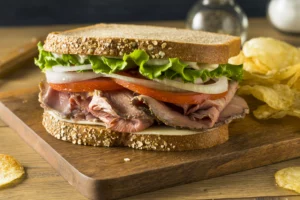Is Beef Good for Young Athletes?
September 19, 2023
September 19, 2023

As school starts and young athletes hone their skills on the field and the courts, parents may be left wondering what to feed these hungry youth. Nicholas Meat recommends looking to beef as research shows that consuming high-quality protein may help one achieve and maintain a healthy weight while also preserving and building muscle.1,2
Protein Supports Strength
We all know it takes muscle to perform on the football field or the volleyball court. But did you know protein helps support strong, lean bodies?3 Eating enough protein-rich food is essential to help protect lean body mass and prevent muscle loss and strength loss as young athletes age.4
Additionally, studies show exercise is more effective when paired with a higher-protein diet. Complete proteins, like beef, provide the amino acids necessary for muscle-building and recovery. Something to consider when your athlete comes home from practice in the new school year!
Adding Protein to Your Diet
The Institute of Medicine’s recommendation for protein intake ranges from 50-175 grams of protein per day for a 2,000-calorie adult diet.5 Specific protein needs will vary depending on age, gender, activity and sometimes health considerations. Given this, it’s important to work with your family doctor or nutritionist to determine the right diet for your family. But, in addition to determining how much protein to add, families should consider WHEN to add protein to their diet. Recent protein research finds that the benefits of protein consumption will vary depending on the amount of protein consumed and the daily pattern of protein consumed.6,7,8,9
Animal proteins, like beef, are nutrient-dense, making them an efficient food to meet your protein needs. One 3 oz. serving of cooked beef provides 25g of protein for only 173 calories.10
Research shows that evenly redistributing protein intake throughout the day may be the most beneficial for overall health and wellness because bodies build muscle in response to each eating occasion, including 30 grams of protein. So, when packing that lunch or considering breakfast, remember to include protein on the menu!